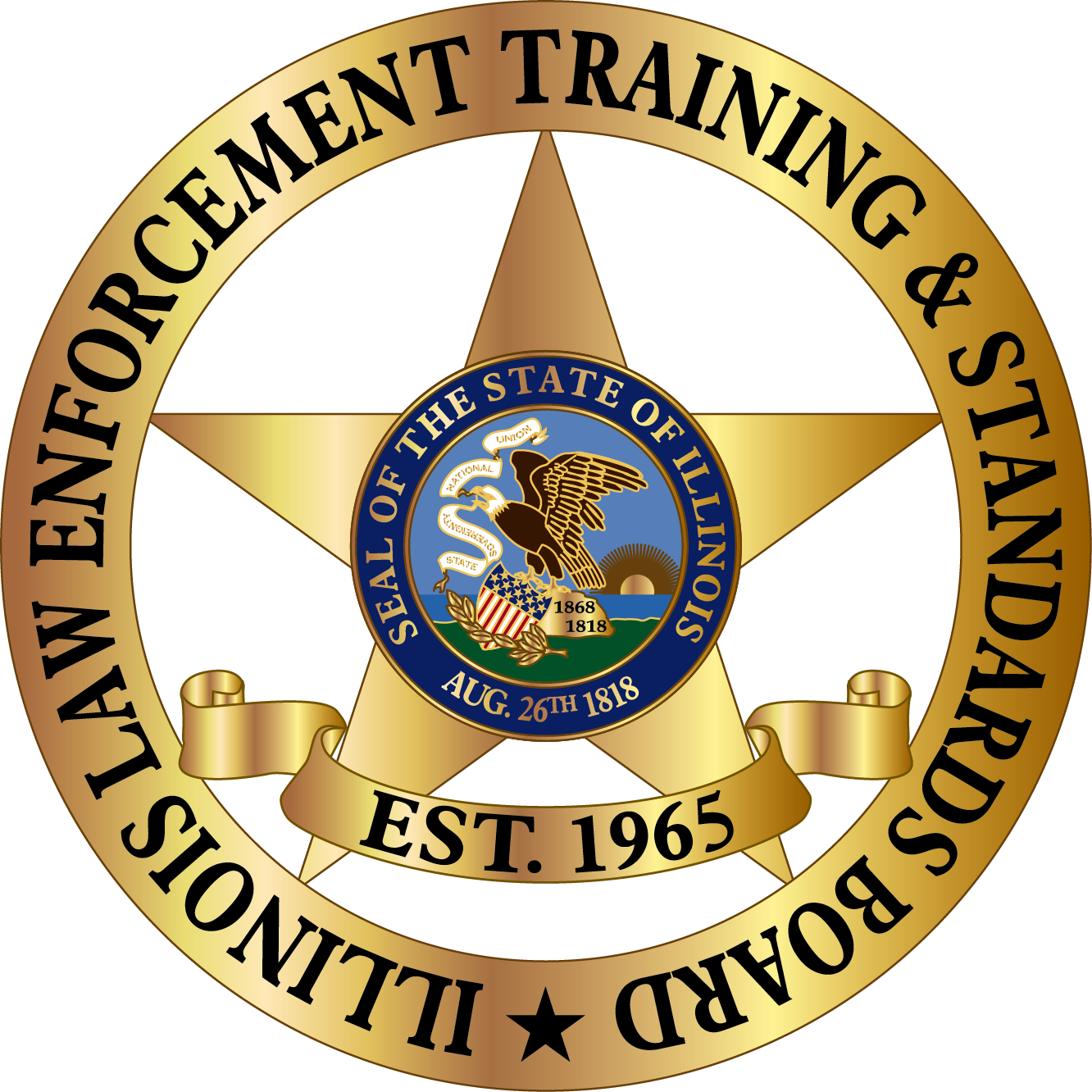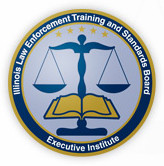
The Illinois Law Enforcement Training and Standards Board is the state agency mandated to promote and maintain a high level of professional standards for law enforcement and correctional officers.
"A Trained Officer is an Effective Officer"

The Illinois Law Enforcement Training and Standards Board is the state agency mandated to promote and maintain a high level of professional standards for law enforcement and correctional officers.
"A Trained Officer is an Effective Officer"
Posted: 2/4/2026
ILETSB is pleased to announce that the Crisis Response Therapy Canine Team Application is now available. This program, in collaboration with the Cook County Sheriff's Office, formally certifies law enforcement handlers and agency-authorized therapy canine teams for deployment in crisis calls, peer support, and community engagement.
Go to https://www.ptb.illinois.gov/training/crisis-intervention-team-cit/crisis-response-therapy-canine-certification-program/ to find the application and requirements for the program.
Posted: 1/5/2026
The Illinois Law Enforcement Training and Standards Board, in partnership with the Cook County Sheriff’s Office, has approved the nation’s first formal certification program for law enforcement crisis response therapy canine teams. This new standard integrates Crisis Intervention Team (CIT) principles, de-escalation, and trauma-informed response to support individuals, officers, and communities during times of crisis.
Posted: 12/29/2025
Beginning January 1, officers with last names beginning with the letters A–G may complete the new Officer Verification Form in the ILETSB Officer Portal. All required verifications must be submitted no later than January 30.
For more information about the verification process, including the ability to request an extension waiver, please see the materials below:
• Verification Presentation to the Board – December 2025
• Verification Executive Summary
• Email to LEDI Administrators
• Verification FAQ
• ILETSB Officer Portal
• LEDI Agency Administration Portal
Posted: 12/19/2025
On December 11, 2025, the Illinois Law Enforcement Training & Standards Board approved updates to its In-Service Approved Guidelines. You can find the latest version of these guidelines here, or on our Model Policies and Guidelines page
Pursuant to Board Policy adopted in December 2013 all in-service courses shall be delivered and certified through the Mobile Team system unless the course and/or venue is approved by the Board on an individual basis. The Mobile Teams shall have the option of providing all in-service courses. If the Mobile Team declines the delivery of any course within its region for reasons other than duplication, the Board may determine whether the course is otherwise certifiable and/or reimbursable based upon the best interests of law enforcement. Board certificates may be provided to individuals that the Mobile Training unit can identify as having successfully completed a Board-certified course.
Certification shall be reviewed by the Board on an annual basis.
Board Policy Adopted December 12, 2013
Posted: 12/9/2025
The first officer verification cycle created under the SAFE-T Act has officially begun. Only active, certified officers with last names starting with A through G must complete their verification form during January and finish all required training by January 29, 2026.
To make this process easier, we have updated the LEDI Officer Portal so officers can now see their training status based on the reporting period by clicking on the “View your training history for this reporting period” button located at the bottom of the new verification tab.
If an officer or agency believes they will not be able to finish the required training by January 29, 2026, and there are mitigating circumstances, a verification extension waiver may be requested. This verification extension waiver is only approved in limited situations. Request forms are found in the In the Officer Portal under the new “Verification” tab or in LEDI on the home screen.
Pursuant to the SAFE-T Act, verification extension waiver requests must be submitted by December 31, 2025. Requests submitted after this date cannot be considered. Please note that verification extension waivers are only granted for significant circumstances, as explained in the verification extension waiver instructions.
Please click here for Frequently Asked Questions
Posted: 10/15/2025
The FY26 Law Enforcement Camera Grant application period is now open! The purpose of this program is to provide grants to Illinois police agencies of municipalities, counties, park districts, public universities, and all units of Illinois local governmental for the purchase or lease of in-car video cameras for use in law enforcement vehicles; officer-worn body cameras for law enforcement officers and data storage related to officer-worn cameras; and training for law enforcement officers in the operation of the cameras. (20 Ill. Adm. Code 1705.100-199) Applications for this opportunity must be submitted to the Board via AmpliFund by 5:00pm CST on Wednesday, December 31st, 2025.
More information can be found on our website at: ILETSB - Grant Information
Posted: 10/1/2025
On October 1 of each year, the Board shall send notice to all certified law enforcement officers of the upcoming deadline to submit the compliance verification form. 50 ILCS 705/8.4(b)
Under the SAFE-T Act, all active officers must complete a certification verification every three years. This requires each officer to attest that they have met all of the applicable training mandates, any reported prior terminations, and remain free from reportable misconduct within the verification period.
For officers whose last names begin with the letters A through G, this period started on January 30, 2023 and will conclude on January 29, 2026. Beginning on January 30, 2026, these officers must complete and deliver their verification forms to the Board before the close of March 31, 2026. The reporting periods of all officers is as follows:
Officers will be sent notices and must submit their documentation through the newly created “Officer Portal”. This requires the creation of an account and the use of a personal email address.
As of today, notices have been sent to officers and their respective agencies advising them of these requirements and the upcoming deadlines.
Should you have any questions on this, please contact: ptb.certification@illinois.gov
Posted: 9/24/2025
Annual Camera Reports - UPDATE
All law enforcement agencies that are now utilizing body-worn cameras and/or in-car cameras will need to submit their annual report(s) to the following new email address: PTB.CameraReporting@Illinois.gov.
This new email address is only for the ILETSB annual reports submission. The Illinois General Assembly and the Governor’s Office emails HAVE NOT changed their email addresses and should continue to be used alongside our new Email. The updated email address will be for ALL reports relating to body-worn cameras and in-car camera reports. It applies to all agencies, regardless of whether they received ILETSB grant funding for cameras.
The body-worn camera and in-car camera spreadsheet templates can be found here: https://www.ptb.illinois.gov/resources/forms-information/.
Please remember that the spreadsheets are ONLY necessary if your agency received ILETSB grant money towards cameras. If your agency did not receive ILETSB grant money for cameras, then only the shorter report on department letterhead is required annually.
Please remember that the annual reports are due each year by May 1 for the preceding CALENDAR year. The reports must be sent to the following three addresses:
ILETSB: PTB.CameraReporting@Illinois.gov
Governor’s Office: Gov.Reports@Illinois.gov
Illinois General Assembly: Reports@ILGA.gov
Posted: 9/24/2025
SPRINGFIELD, IL – The Herrin Police Department announced Officer Kevin R. Bailey as the first new hire in the state certified through the military police reciprocity program launched earlier this year by the Illinois Law Enforcement Training and Standards Board (ILETSB).
The swearing-in ceremony on Wednesday, September 17, at Herrin City Hall, marks a significant milestone between Illinois law enforcement and state officials in an effort to streamline hiring for qualified U.S. military police veterans. Illinois joined 18 other states in May of this year, allowing for Military Police veterans to qualify for law enforcement training requirements.
"It’s exciting that we could lead the way in this new hiring pipeline,” said Herrin Police Chief David Dorris. “It was a simple process, and I thank both the U.S. military and the state of Illinois for their collaboration."
Military Police were previously ineligible for certification reciprocity and were required to complete a 640-hour Basic Law Enforcement Academy training. Officer Bailey, a former U.S. Army military police officer, highlighted the direct applicability of his military skills to his new role.
"In the military, we learned to be able to adapt to various situations. I’m able to apply that adaptability in my current role. The skills are definitely transferrable,” said Officer Bailey.
This historic hiring showcases the effectiveness of the Illinois initiative in assisting police departments with the recruiting of top-tier talent.
"Today's announcement honors the commitment of our service members by opening a clear path into law enforcement careers across Illinois," said Keith Calloway, Executive Director of the Illinois Law
Enforcement Training and Standards Board. "This is about honoring their experience while meeting our state's workforce needs in a responsible and impactful way."
The new pathway is now active and available for eligible veterans. To become certified, applicants must meet specific requirements after being granted the waiver request, including:
For more information on the military police reciprocity program, please go to our webpage here or email PTB.Certifications@illinois.gov.
###
About ILETSB
The Illinois Law Enforcement Training and Standards Board is the state agency mandated to promote and maintain a high level of professional standards for law enforcement, correctional, and court security officers. Its purpose is to promote and protect citizen health, safety, and welfare by assisting municipalities, counties, special districts, universities, colleges, and other local governmental agencies of this state in their efforts to upgrade and maintain a high level of training and standards for law enforcement personnel.
Posted: 9/11/2025
The Department of Justice’s Office of Community Oriented Policing Services (COPS Office) today announced a partnership between the COPS Training Portal and the Illinois Law Enforcement Training and Standards Board (ILETSB) to promote free online training.
ILETSB has agreed to award credit towards its annual training requirements for 28 current certificate-awarding courses on the COPS Training Portal, with plans to approve future courses that address state-level training mandates as they launch. To ensure that Illinois’ 30,000 law enforcement officers receive credit for these trainings, the COPS Training Portal will provide data directly to ILETSB, removing any reporting burden on individual officers, agencies, and the Mobile Training Units that form the backbone of ILETSB’s training system. Illinois becomes the second state to partner with the COPS Office to broadly provide credit for COPS Training Portal courses, following the 2022 partnership with Arizona Peace Officer Standards and Training (AZPOST).
“The COPS Office is proud to provide Illinois, and the entire nation, high-quality, timely, and accessible training through the COPS Training Portal,” said Hugh T. Clements, Jr., Director of the COPS Office. “The Portal is a cornerstone of our training program, offering individuals, agencies, and even entire states the opportunity to learn and engage with important topics such as crisis response, traffic safety, and of course, community policing. By sending training completion data directly to ILETSB, we are able to save agencies time, effort, and funds that would otherwise need to be spent gathering and submitting that same information, letting everyone get back to the critical business of policing. I appreciate and applaud the commitment to serving the law enforcement community in Illinois that ILETSB leadership and staff have shown as we worked on this partnership, and I am excited to see the benefits that will accrue to Illinois’ 30,000 police officers, sheriff’s deputies, and troopers. The COPS Office is eager to continue to partner with POSTs and agencies across the country to bring our dozens of courses to the dedicated men and women who protect our communities every day. Online training does not replace in-person training, but using the COPS Training Portal allows agencies to focus their limited funding on the topics that must be learned in person.”
The COPS Training Portal (copstrainingportal.org) was launched in 2017, and now boasts 40 training courses and more than a dozen resources on a wide variety of law enforcement topics, with more trainings constantly in development. The COPS Office is dedicated to providing high-quality training to the field as part of its mission to advance the practice of community policing in the United States. Illinois law enforcement officers who wish to receive credit for COPS Training Portal courses should enter their PTB ID upon registering, or update their profile to add the PTB ID. Individuals who completed courses after their approval, but prior to this announcement, can still receive credit for those trainings. A full list of courses and their corresponding approvals can be found at https://copstrainingportal.org/project/state-approved-courses/.
Posted: 8/6/2025
Putting Our Best Paw Forward to Support Illinois Communities
SPRINGFIELD, IL – Today, the Illinois Law Enforcement Training and Standards Board (ILETSB) is pleased to announce the passage of Senate Bill 1491, a new law that will enhance crisis and emergency response capabilities across the state through the integration of certified therapy dog teams. Senate Bill 1491 was recently signed into law by Governor JB Pritzker on Friday, August 1, 2025.
Effective January 1, 2026, Senate Bill 1491 requires ILETSB to develop a comprehensive course and certification program for law enforcement officers who will work with therapy dogs in crisis and emergency response situations. This initiative aims to ensure that trained therapy dog teams are available to provide comfort and support during critical incidents, benefiting both individuals in crisis and responding officers. This program will allow for a mutual aid network of therapy dog teams to be dispersed throughout the state when they are needed the most.
“This is a significant moment for communities across Illinois,” said Jennifer Wooldridge, the state CIT coordinator and K-9 handler of 'Trooper' from the Illinois Law Enforcement Training and Standards Board. “Now more than ever, our communities need this support. The ability for people to express their grief and relieve their stress in the presence of these wonderful K-9s is truly impactful.”
This new program will build upon existing crisis intervention team training efforts, providing additional valuable resources for law enforcement agencies and the communities they serve. ILETSB will be working diligently to establish the curriculum and certification standards, and further details regarding the program development and rollout will be shared on the website in the coming months.
“Therapy dogs have the ability to help reduce stress-induced trauma, bringing instant comfort and relief,” said Sen. Mary Edly-Allen (D-Libertyville). “This law will improve officer wellness and make certified therapy K-9s more accessible to help those in a time of need.”
Following the passage of Senate Bill 1491, ILETSB will develop a course and certification program for law enforcement therapy dog teams. ILETSB will emphasize the use of therapy dogs with crisis and emergency response. Furthermore, our board will aim to ensure that certified K-9 teams are available in various regions throughout the state.
For more information and future updates on the development of the certified therapy dog team program, please visit the ILETSB website at ptb.illinois.gov
###
About ILETSB
The Illinois Law Enforcement Training and Standards Board is the state agency mandated to promote and maintain a high level of professional standards for law enforcement, correctional, and court security officers. Its purpose is to promote and protect citizen health, safety, and welfare by assisting municipalities, counties, special districts, universities, colleges, and other local governmental agencies of this state in their efforts to upgrade and maintain a high level of training and standards for law enforcement personnel.
Posted: 8/4/2025
SPRINGFIELD, IL – Today, the Illinois Law Enforcement Training and Standards Board (ILETSB) announced its plan to implement Senate Bill 1195, known as "Anna's Law," which was recently signed into law by Governor JB Pritzker. Anna’s Law, effective January 1, 2026, was spearheaded by Sen. Mary Edly-Allen, D-Ill., significantly enhances trauma-informed training requirements for law enforcement officers across the state, particularly concerning interactions with victims of sexual assault and sexual abuse.
Anna's Law mandates that the curriculum for probationary law enforcement officers will now include a dedicated block of instruction on trauma-informed programs, procedures, and practices designed to minimize victim traumatization. Furthermore, critical trauma-informed principles will be integrated into the minimum in-service training requirements that all law enforcement officers must complete every three years. The law also requires ILETSB to conduct or approve training programs that address trauma-informed responses and investigations, including identifying and addressing conflicts of interest.
"The signing of Anna's Law marks a pivotal moment for law enforcement in Illinois," said Sean Smoot, Board Chairman of the Illinois Law Enforcement Training and Standards Board. "This legislation underscores our collective commitment to ensuring that every officer is equipped with the knowledge and skills to respond to victims of sexual assault and sexual abuse with the utmost sensitivity, empathy, and professionalism."
ILETSB has been preparing for the enactment of Anna's Law and is expanding our training programs and resources to support agencies and officers in meeting these new requirements. The Board will work closely with law enforcement agencies, training academies, and community groups to ensure a seamless transition and consistent application of the new standards statewide.
“As a teacher, it is extremely important to me to come from a position of helping people learn and grow. The intent of this legislation is to focus attention on how law enforcement handles survivors of sexual assault,” said Sen. Mary Edly-Allen (D-Libertyville). “While we have come a long way, there is still much work to be done to address this issue. And when we know better, we do better.”
###
Posted: 5/7/2025
SPRINGFIELD, IL — Today, the Illinois Law Enforcement Training and Standards Board (ILETSB) announced the approval of military reciprocity for service members transitioning into civilian law enforcement careers. Illinois joins 18 other states in supporting veterans and active-duty service members by recognizing military training and experience in the law enforcement certification process.
This announcement comes during Military Appreciation Month, supporting those who wish to continue to serve their communities after active duty by creating a streamlined process for individuals with military experience to pursue careers in civilian law enforcement.
“Today's announcement honors the commitment of our service members by opening a clear path into law enforcement careers across Illinois,” said Keith Calloway, Executive Director of the Illinois Law Enforcement Training and Standards Board. “This is about honoring their experience while meeting our state's workforce needs in a responsible and impactful way.”
The new policy marks a significant change as military police were previously ineligible for certification reciprocity, requiring them to complete the full 640-hour Basic Law Enforcement Academy regardless of their extensive Department of Defense training and operational experience. Now, eligible veterans will be able to request a certification waiver just as applicants from other states and federal agencies currently can.
“This progressive approach by Illinois serves as a beacon for other states,” said Colonel Phillip Warren, Assistant Commandant, U.S. Army Military Police School. “By recognizing the training of military police, Illinois not only honors the service of our soldiers, but also addresses the pressing need for qualified law enforcement officers within the state.”
This policy is the result of months of collaboration between ILETSB, military leadership, and state partners, with the goal of easing the transition to civilian service roles and strengthening recruitment pipelines for law enforcement agencies statewide. During a critical period of staffing challenges nationwide, this change expands the state’s recruitment pool to encourage individuals with relevant experience and a history of public service to continue their careers in a leading veteran-friendly state.
“Our Illinois Army National Guard Military Police and Air National Guard Security Forces personnel spend a lot of time training and learning law enforcement techniques in our ranks. This program expands the number of military occupational specialties that can translate into civilian careers,” said Maj Gen. Rodney Boyd, the Adjutant General of the Illinois National Guard. “Illinois National Guard Soldiers and Airmen are great employees who perform well under pressure, possess great integrity, and are professional in everything they do.”
The new pathway is now active and available for eligible veterans. To become certified, applicants must meet specific requirements after being granted the waiver request, including:
Additional information and application instructions can be found at ptb.illinois.gov
*Currently Not Applicable to National Guard and Reserve Components
About ILETSB
The Illinois Law Enforcement Training and Standards Board is the state agency mandated to promote and maintain a high level of professional standards for law enforcement and correctional officers. Its purpose is to promote and protect citizen health, safety, and welfare by encouraging municipalities, counties, park districts, State-controlled universities, colleges, public community colleges and other local governmental agencies of this state and participating State agencies in their efforts to upgrade and maintain a high level of training and standards for law enforcement personnel.
###
Posted: 4/24/2025
Join professionals from across the state for the premier Illinois event dedicated to Crisis Intervention Team (CIT) training, mental health collaboration, and community safety.
This multidisciplinary conference is designed for first responders, law enforcement, fire service, EMS, social workers, crisis clinicians, and mental health advocates to come together, share strategies, and enhance their skills in compassionate, effective crisis response.
Who Should Attend:
Police Officers | Firefighters | Paramedics | Emergency Dispatchers | Social Workers | Crisis Clinicians | Mental Health Advocates
What to Expect:
- Powerful Keynote Speakers
- Breakout Sessions
- Roundtable Discussions
- Networking Opportunities
- Mental Health Insights
- Special Guest Speakers
- Awards Ceremony
Registration Fees:
- In-State Single Registrant: $175
- Out-of-State & Federal Registrant: $225
- Group Rate (2+ Registrants): $160 per person
Mark your calendars and be part of this impactful event strengthening Illinois' crisis response efforts.
Register by clicking HERE
Posted: 4/3/2025
The Illinois Law Enforcement Training & Standards Board (ILETSB) hosted WAND TV and WCIA TV for an inside look at our VirTra simulator, a cutting-edge tool designed to enhance law enforcement training.
This advanced technology provides officers with an immersive, scenario-based training to help them develop critical decision-making skills in high-pressure situations.
Thank you to the Chatham Police Department for their support, particularly Officer Dave Leach, who played a crucial role in demonstrating the simulator's capabilities. Officer Leach demonstrated how this technology is being utilized to enhance our law enforcement officers throughout Illinois.
Thank you to WAND TV and WCIA TV for covering our story.
The complete story can be found here: Illinois Officers Undergo Training Through Interactive Simulator
Posted: 3/23/2025
The Illinois Police Officers Memorial Committee will hold their 2025 Ceremony on Thursday, May 1st. Officers killed in the line of duty during the calendar year 2024 will be honored. For more information, please visit their website.
Posted: 3/23/2025
At the March 6th Board meeting, several “bills of interest” were mentioned in the legislative update. To see a list of these bills and ILETSB’s brief summary, please click here. You may follow the links on each bill's number to view the full text of the corresponding bill on the ILGA website.
Posted: 3/18/2025
Join us on June 25-26, 2025, at the Embassy Suites in East Peoria, for expert-led training to enhance crisis response and strengthen community partnerships. This conference offers breakout sessions, networking and practical strategies to improve real-world crisis response.
Register today by heading to https://whova.com/portal/registration/-svnIhOOOsa6feh4QNqo/.
Posted: 3/17/2025
SPRINGFIELD, IL — The Illinois Law Enforcement Training and Standards Board (ILETSB) wants to remind law enforcement agencies that grant funding for the Body-Worn Camera (BWC) program and the National Integrated Ballistic Information Network (NIBIN) program are still available. These grant programs provide critical funding to law enforcement agencies across the state by assisting with state-mandated body-worn camera requirement compliance or supporting the expansion and enhancement of ballistic technology.
“The NIBIN and Body-Worn Camera grants are critical tools to help our law enforcement agencies improve their investigative capabilities and transparency,” said Keith Calloway, Director at ILETSB. “We strongly encourage all eligible agencies to take advantage of these remaining funding opportunities.”
In 2024, ILETSB awarded a record $9.9 million through the BWC grant program, benefiting 171 law enforcement agencies, and $1.4 million through the NIBIN grant program. So far, at least 101 agencies have submitted applications for 2025 funding. The deadline for the BWC and NIBIN grants is April 1, 2025, and agencies are encouraged to apply as soon as possible.
Agencies interested in applying for 2025 funding can find eligibility requirements and application details on the ILETSB website at https://www.ptb.illinois.gov/resources/grant-information/.
For more information, please email ptb.grants@illinois.gov.
###

Since 2003, the Illinois Law Enforcement Training and Standards Board (ILETSB) has provided state-certified Crisis Intervention Team (CIT) training to law enforcement officers throughout Illinois. To date, the ILETSB has certified over 5700 officers statewide, from more than 350 agencies in this specialized program.

In accordance with the Federal Act, Illinois passed Public Act 94-103 (2005) that provides for the annual certification of retired law enforcement officers qualified under federal law to carry a concealed weapon.

Through innovative education, training, research, and services the Executive Institute will guide the law enforcement community to achieve higher standards and professional development that will enhance their mission of providing professional law enforcement services to their constituents.

The Law Enforcement Document Exchange (formerly EDI) is a web-based application that allow users (Law Enforcement Agencies and States Attorneys offices) to access their personnel roster, firearms re-qualification roster and to submit notices of appointment/separation.
For more information or to sign up for LEDI, please visit our LEDI Information page.